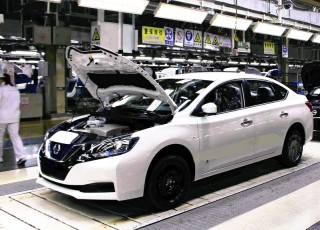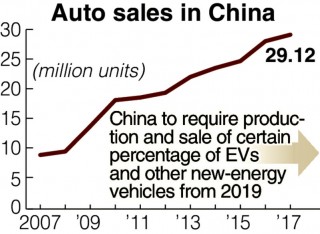Loading
Search
▼ Suzuki Withdraws From China
- Category:Other
Suzuki Motor Corp. has announced that it will transfer its entire 50 percent stake in the joint venture company Chongqing Changan Suzuki Automobile Co. to its partner in the enterprise, Chongqing Changan Automobile Co.
Suzuki previously dissolved a joint venture with another Chinese automaker in June, and plans to withdraw from production in China.
“We’ve made efforts to cultivate the Chinese market. However, due partly to the shifting of the Chinese market toward larger vehicles, we’ve decided to transfer all equity to [Chongqing] Changan Automobile,” Suzuki Chairman Osamu Suzuki said in a statement Tuesday.
Chongqing Changan Suzuki will continue production and sales of Suzuki brand vehicles.
Suzuki formed the joint venture company with Chongqing Changan Automobile in 1993 and another with Jiangxi Changhe Automobile Co. in 1994 to produce and sell its vehicles in China. Suzuki transferred all of its shares in the joint venture with Jiangxi Changhe to its Chinese partner in June.
Couldn’t keep up
Suzuki’s exit from the world’s largest automobile market stems from the company’s inability to keep up with rapid changes in the China market, with vehicles becoming bigger and electric vehicles (EVs) growing in popularity. As a result, Suzuki faced difficulty increasing its market share for compact cars, one of the Japanese automaker’s main strengths.
On the other hand, Toyota Motor Corp., Honda Motor Co. and Nissan Motor Co. have stepped up production in China, shedding light on which Japanese automakers have won and which have lost in the country.
“Although other automakers are growing, Suzuki’s sales kept declining. It was a matter of how long the business could continue,” a person close to Suzuki said, suggesting that Suzuki’s exit from China was inevitable.
Many Japanese manufacturers regard the Chinese market as a primary source of future profits, and are strengthening local production and marketing. China reported 29.12 million vehicle sales in 2017, far larger than the 17.58 million reported by the United States. Some observers say China’s annual auto sales are expected to reach 40 million units by 2030.
Japanese automakers have made serious inroads into China since the 1990s with an eye toward market expansion. Suzuki formed a joint venture with Chongqing Changan in 1993 and began producing vehicles in China. Initially, Suzuki enjoyed a degree of popularity for its compact cars, in which the company enjoys an advantage.
Suzuki previously dissolved a joint venture with another Chinese automaker in June, and plans to withdraw from production in China.
“We’ve made efforts to cultivate the Chinese market. However, due partly to the shifting of the Chinese market toward larger vehicles, we’ve decided to transfer all equity to [Chongqing] Changan Automobile,” Suzuki Chairman Osamu Suzuki said in a statement Tuesday.
Chongqing Changan Suzuki will continue production and sales of Suzuki brand vehicles.
Suzuki formed the joint venture company with Chongqing Changan Automobile in 1993 and another with Jiangxi Changhe Automobile Co. in 1994 to produce and sell its vehicles in China. Suzuki transferred all of its shares in the joint venture with Jiangxi Changhe to its Chinese partner in June.
Couldn’t keep up
Suzuki’s exit from the world’s largest automobile market stems from the company’s inability to keep up with rapid changes in the China market, with vehicles becoming bigger and electric vehicles (EVs) growing in popularity. As a result, Suzuki faced difficulty increasing its market share for compact cars, one of the Japanese automaker’s main strengths.
On the other hand, Toyota Motor Corp., Honda Motor Co. and Nissan Motor Co. have stepped up production in China, shedding light on which Japanese automakers have won and which have lost in the country.
“Although other automakers are growing, Suzuki’s sales kept declining. It was a matter of how long the business could continue,” a person close to Suzuki said, suggesting that Suzuki’s exit from China was inevitable.
Many Japanese manufacturers regard the Chinese market as a primary source of future profits, and are strengthening local production and marketing. China reported 29.12 million vehicle sales in 2017, far larger than the 17.58 million reported by the United States. Some observers say China’s annual auto sales are expected to reach 40 million units by 2030.
Japanese automakers have made serious inroads into China since the 1990s with an eye toward market expansion. Suzuki formed a joint venture with Chongqing Changan in 1993 and began producing vehicles in China. Initially, Suzuki enjoyed a degree of popularity for its compact cars, in which the company enjoys an advantage.
In recent years, however, Chinese consumer preferences have shifted toward larger, more expensive vehicles due to such factors as rising income levels. As a result, the market share of sport-utility vehicles has risen, and Suzuki’s China sales in fiscal 2017 fell 28.8 percent from the previous year.
Suzuki also failed to adjust to the rapid advancement of vehicle electrification in China. From 2019, the Chinese government will require sales of “new energy vehicles,” such as EVs, to constitute a certain percentage of automakers’ total unit sales. As Suzuki does not produce or sell EVs, it has given up on China, where it suffered sluggish sales. Instead, it will focus on India, where it ranks first in market share.
On the other hand, SUVs produced by other Japanese automakers have sold well in China, with Nissan’s X-Trail model emerging as a big hit. Toyota plans to build a new factory in Guangzhou and raise its production capacity in China by 35 percent to about 1.7 million units per year.
Nissan plans to increase output from its current 1.7 million units per year to 2.6 million by 2022. The automaker has already begun mass production of EVs, while Honda plans to start selling EVs in China within the year.
The China market will continue to be a major battleground for automakers. Automakers will need flexible strategies to boost production and sales, such as releasing new models in response to shifting market trends.
“The days in which ‘whatever is made will sell’ are now over,” declared a person involved with a leading auto manufacturer.
Suzuki also failed to adjust to the rapid advancement of vehicle electrification in China. From 2019, the Chinese government will require sales of “new energy vehicles,” such as EVs, to constitute a certain percentage of automakers’ total unit sales. As Suzuki does not produce or sell EVs, it has given up on China, where it suffered sluggish sales. Instead, it will focus on India, where it ranks first in market share.
On the other hand, SUVs produced by other Japanese automakers have sold well in China, with Nissan’s X-Trail model emerging as a big hit. Toyota plans to build a new factory in Guangzhou and raise its production capacity in China by 35 percent to about 1.7 million units per year.
Nissan plans to increase output from its current 1.7 million units per year to 2.6 million by 2022. The automaker has already begun mass production of EVs, while Honda plans to start selling EVs in China within the year.
The China market will continue to be a major battleground for automakers. Automakers will need flexible strategies to boost production and sales, such as releasing new models in response to shifting market trends.
“The days in which ‘whatever is made will sell’ are now over,” declared a person involved with a leading auto manufacturer.
- September 6, 2018
- Comment (0)
- Trackback(0)



